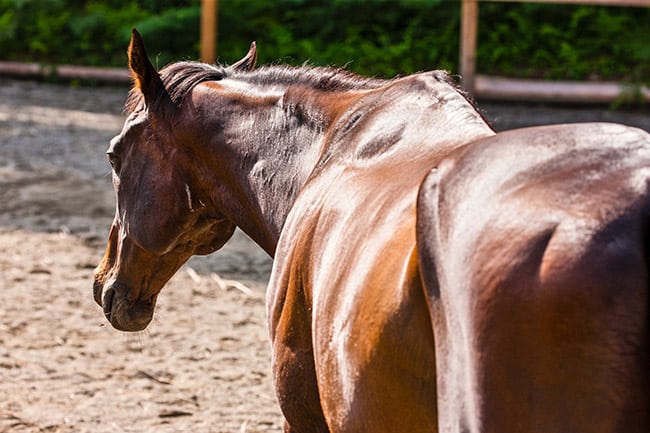
Smart Manure Management for Small Horse Farms
Find out how to manage and remove horse waste from your farm in a safe and effective way.
Proper feeding practices for foals, adult horses, and older horses

Find out how to manage and remove horse waste from your farm in a safe and effective way.

If you can see your horse’s ribs or his topline is lacking, he might need to gain weight or muscle. But how can you tell which he needs?

Explore the methods used to diagnose food-related issues in horses and effectively manage their clinical signs.

Sustainable hay production involves practices that protect the environment while yielding high-quality hay. Here’s how to grow or source sustainably produced hay.

While steeped in tradition, feeding bran mashes can cause GI distress in horses. Learn why, and discover alternatives.

Researchers have shown feeding horses alfalfa prior to riding can help buffer stomach acid and offers relief for ulcer-prone horses. But is hay or a pellet better?

Horses with EMS are often overweight or obese and also at an increased risk of developing laminitis. Implement these 5 strategies to manage your EMS horse more effectively.

Learn how to feed growing horses correctly to avoid developmental orthopedic disease.

What does it take to optimize a horse’s immune response and fight off disease? Read more in this article from the Spring 2025 issue of The Horse.

An equine nutritionist explains how to address common nutrition challenges when feeding horses with the dental condition EOTRH, before and after surgery.

Scientists recently examined the role of dopamine in horses with PPID and ID, as well as how pergolide affects dopamine receptors to treat metabolic problems.

Some medications are critical for horses’ health but don’t taste great. Here are tips from an equine nutritionist to encourage them to eat their pills.

Feeding senior horses doesn’t have to be complicated. Some need nutrition adjustments based on their health status and body condition. Sponsored by Sentinel Equine Nutrition.

Find out which horses and ponies have a higher genetic risk for EMS and how to manage them.

Overweight horses and some breeds are predisposed to metabolic problems. Here’s how to feed horses with ID and calculate if your horse’s meal has a safe level of NSCs.

Find out how much protein your horse’s diet provides and whether it comes from high-quality sources.
Stay on top of the most recent Horse Health news with
"*" indicates required fields